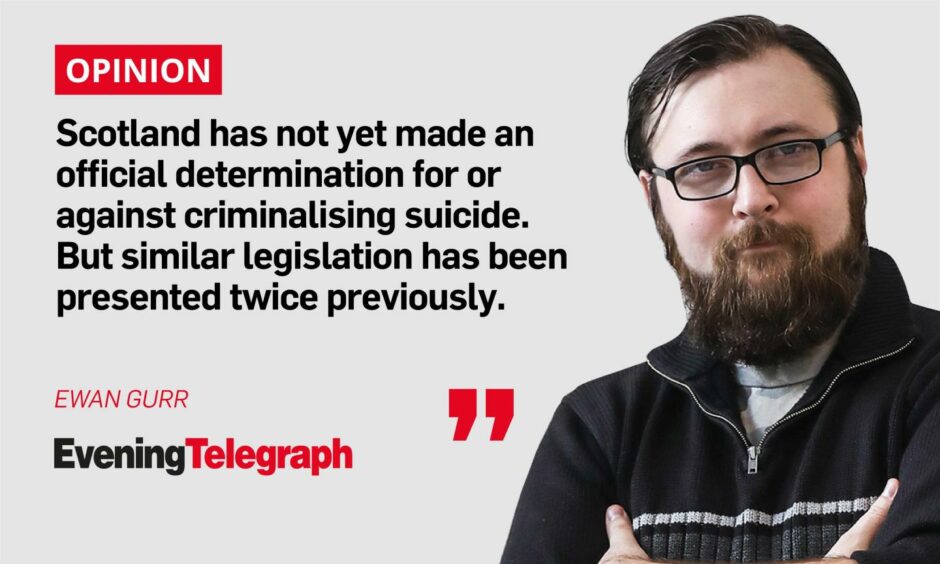Dundee was recently identified as home to the second-lowest levels of life expectancy in Scotland.
And as you would expect, much of our political discourse relates to efforts to turn this around.
Greater investment in social security, efforts to eliminate drugs deaths and tackling the attainment gap are among the measures being proposed to boost people’s life chances.
It is with trepidation then that many of us await a bill on “assisted dying” – the legal consent for someone who wishes to end their life to do so, assisted by the state.
 Proposed legislation is being drawn up for Holyrood and is under consideration at Westminster.
Proposed legislation is being drawn up for Holyrood and is under consideration at Westminster.
The existing laws are complex and differing.
The Suicide Act 1961 criminalised attempts to encourage or assist suicide in England and Wales.
However, later guidance from the Crown Prosecution Service softened this rule, enabling families who assist a person to end their life to avoid prosecution.
Scotland has not yet made an official determination for or against criminalising suicide.
But similar legislation has been presented twice previously.
The late Margo MacDonald appealed for her right to die when presenting the Assistance in Dying Bill in 2010.
It was rejected by 85 votes to 16.
An Assisted Suicide Scotland Bill was presented in 2015 and was also voted down by 82 votes to 36.
Nicola Sturgeon voted against both bills.
In the first instance, when she was cabinet secretary for health and wellbeing, she cited concerns over “undue influence” being exerted over vulnerable people.
Assisted dying critics raising the alarm
A new campaign has been launched in Scotland to oppose the legislation.
It raises similar concerns.
Better Way, a coalition of academics, disability activists and medical experts, has presented evidence from Canada and testimonies from people with “lived experience of terminal illness” who argue for maintaining current provisions.
Better Way is backed by Jamie Gillies, a long-time campaigner who previously led opposition to the Scottish Government’s Hate Crime Bill.
A warning from Canada, which legalised assisted suicide in 2016. The law has been radically extended and is resulting in profound injustices against marginalised and vulnerable citizens. If UK legislators open the door to 'assisted dying' here, they risk this same, dark future. pic.twitter.com/r0o0CNZPS8
— Jamie Gillies (@jmgillies) October 1, 2021
On Saturday, he spoke publicly at a meeting in Dundee, saying: “I strongly believe the practice of assisted suicide, often called ‘assisted dying’, is both ethically and morally wrong and damaging for society.”
He added: “All human life is inherently precious and worthy of dignity and respect, but legalising state-endorsed suicide undermines that value.”
Better Way also enjoys the support of Dr Miro Griffiths, a disabled academic from the University of Leeds; David A Jones, a professor of Bioethics at St Mary’s University, and Dr Joel Zivot, a practicing anaesthesiologist from Atlanta, Georgia.
Zivot contends with the idea that assisted suicide is painless.
He says: “The proposals will see patients prescribed a lethal dose of 100 barbiturate pills. Without an anaesthetic, many will be in great discomfort, even if outwardly they don’t appear to be suffering.”
Palliative care experts share concerns
Last month, the British Medical Association (BMA) adopted a position of neutrality on assisted dying.
Days later, 21 newly-qualified palliative care specialists wrote a strongly-worded letter to the Daily Telegraph, stating: “The BMA does not represent us. We are not neutral.”
The letter said legislating for assisted suicide would represent “a seismic shift” and would “fundamentally alter the patient-doctor relationship and destroy the trust that is so essential to our work”.
BREAKING NEWS.
Today, the British Medical Association (BMA) finally dropped its longstanding opposition to assisted dying.
This is a HUGE milestone for our campaign. https://t.co/RzeylaFLQt
— Dignity in Dying (@dignityindying) September 14, 2021
The palliative care specialists, who know the concerns and needs of those at the end of their lives better than most, are not alone in their concern.
I cannot find a charity representing disabled people which supports these proposals.
And with concern spread across the Scottish Labour, Scottish Conservative and Scottish National Party benches, we may indeed see forthcoming proposals fail again.
If so it will come down to the coherence of opposing campaigns proposing a better way.
